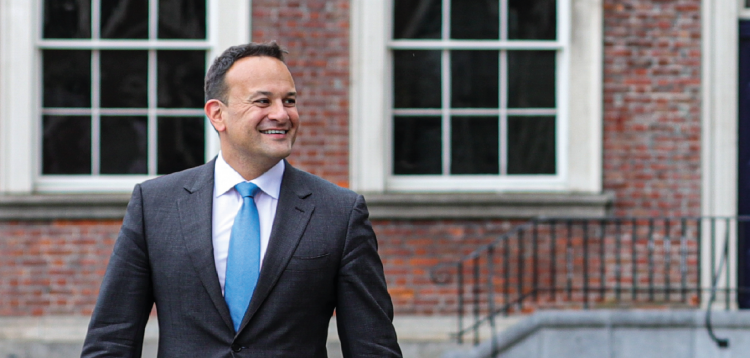Leo Varadkar returned to the office of Taoiseach on Saturday following a smooth transition of power with Fianna Fáil leader Micheál Martin.
The coalition has remained remarkably cohesive since coming to power, particularly considering the barrage of crises which has plagued much of its time in office. Its support is moving upwards based on recent polling, boosted by its recent cost-of-living Budget.
Old & new faces
Much speculation in the corridors of power leading up to the reshuffle was related to which portfolio Micheál Martin would choose, and the subsequent repercussions for his fellow cabinet colleagues. Martin had been originally mooted for a straight swap with Varadkar to the Department Enterprise, Trade and Employment. He was also favored by some to pursue his rigorous passion for education by holding the post of Minister for Further and Higher Education, Research, Innovation and Science – a department Fianna Fáil themselves created upon entering office. However, it was a return to the familiar surroundings of Iveagh House for Martin who takes the post of Foreign Affairs and Defence from Simon Coveney. Martin’s tenure as Taoiseach has seen him heavily involved in efforts to solve the impasse of the Northern Ireland Protocol as well as the EU’s response to COVID-19 and the Russian invasion of Ukraine. Mirroring Martin’s Shared Ireland initiative, which is established within the Department of the Taoiseach, Leo Varadkar has announced the formation of a new unit at the top of Government which will lead on children’s wellbeing and addressing poverty.
A return to the Foreign Affairs portfolio may add further pressure on Martin’s leadership next year as Fianna Fáil backbenchers question how the party can recover electoral support when its leader is likely to spend much of his time abroad. Comparisons can be drawn with Eamon Gilmore’s time in Iveagh House and the ultimate downward spiral which followed in support of the Labour party.
Furthermore, the move won’t quell speculation as to the likelihood of Micheál Martin being nominated for a senior EU role. It’s worth noting that Fianna Fáil will cast the decision on the Government’s nominee for the next EU Commissioner following European elections in 2024.
Simon Coveney’s move to Enterprise, Trade and Employment will be welcomed by the business community and the grassroot members of Fine Gael who hold Coveney in high regard. However, he takes over the portfolio at a time of great uncertainty with global headwinds including the uncertainty regarding employment levels in the technology sector. He will also need to deepen relations quickly with a new permanent CEO of IDA Ireland to be announced.
Elsewhere in cabinet, Michael McGrath becomes finance minister after a straight switch with Paschal Donohoe. Ireland’s influence at EU level is now strengthened with Donohoe’s reelection as Eurogroup President. Both ministers have struck up a warm relationship, similar to the days of the troika when Michael Noonan and Brendan Howlin wore the green jersey and kept the ship afloat.
Minister O’Brien holds on to housing, four days after the Dáil narrowly voted confidence in him. His assured handling of the disruption caused by severe weather conditions has done his reputation as a minister who enjoys rolling up the sleeves no harm. However, there will be no thawing in the overarching challenge of convincing the electorate that enough progress is being made in meeting the scale of the crisis in housing supply, affordability, and homelessness.
Eamon Ryan had flagged in advance that there would be no changes in the Green representatives at cabinet and his A team is now firmly settled for the Government’s second phase of its term in office. The expected publication of Climate Action Plan 2023 next week will renew the party’s determination to ensure the green agenda remains at the heart of the Government.
Most at risk from Saturday’s reshuffle was health minister Stephen Donnelly. Martin chose to renew his loyalty to the embattled health minister. While some Fianna Fáil backbenchers remain unconvinced by Donnelly since his arrival into the party, there may be justification in not changing the guard in the middle of huge challenges in the health sector including a significant rise in winter flu cases. Jack Chambers, who moves to the Department of Transport as a Super Junior, will no doubt feel his credentials as Chief Whip and loyalty warranted the top job at Miesian Plaza. His straight swap with Hildegarde Naughton sees him line up to take on the Greens on road investment. His time as Chief Whip may serve him well in this regard.
The only surprise from Saturday’s announcement was that Minister Harris would temporarily assume the justice portfolio with Helen McEntee on maternity leave. He will combine this role while also continuing to serve as Minister for Higher Education.
Elsewhere, it’s steady as she goes around the cabinet table. We can expect the party leaders to flex their muscles in the coming days as changes are afoot for Ministers of State. Eamon Ryan may seek to bring into the fold some of his patient loyalists on the backbenches while Leo Varadkar and Micheál Martin are likely to freshen up their respective benches too.
Leadership style
While Saturday’s reshuffle was minimal in its changes, the most notable shift may well be in the leadership style of the new Taoiseach. Martin, a cautious leader, was known for being relentlessly focused on policy and succeeded, most of the time, in not being drawn into the tit for tat that comes with frontline politics. Varadkar however is less concerned with upsetting the apple cart and is likely to take a much more aggressive approach to opposition politics, with Sinn Féin being target number one. The gloves are about to come off.






